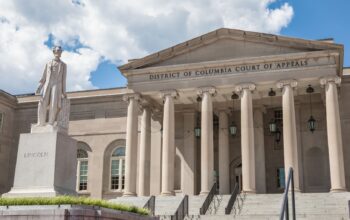For years, Howard University students, faculty, and staff, as well as residents of the Parkview and Columbia Heights neighborhoods have stopped by Morgan’s Seafood located on the intersection of Georgia Avenue and Kenyon Streets in Northwest, to grab a fish sandwich, dinner or other treats that the carryout offers.
Romeo Morgan has managed Morgan’s Seafood for a few decades. However, several years ago, a developer demanded Morgan sell his property for $1.3 million.
“My property is worth five times that much,” Morgan, 59, told The Informer. “The developer refused that amount and then he told me he will force me to sell the property.”
Soon after, Morgan said he received a notice from the District government that his property was designated as “blighted” because it had graffiti on the north side of the building. Morgan said he had no idea who put the graffiti there, but strongly believes it came from someone associated with the developer.
Morgan closed the eatery temporarily due to the coronavirus pandemic and serious health problems but is working to revive the establishment. However, since his initial tussle with the developer, he has been assessed back taxes, accused of rat infestation, charges of litter and other complaints by District agencies.
He said the D.C. government’s actions were baseless.
“I was told that during the pandemic, my taxes would be in abeyance,” he said. “But I received a $70,000 tax bill and had my property sold at a tax sale. How can that be? I thought tax sales were suspended during the pandemic.”
Morgan fought the District government and won, but noticed that other Black property owners were similarly harassed with false vacancy notices and unfounded complaints.
He said the District government is harassing Black businesses on Georgia Avenue and the immediate area to sell their properties to developers at a cheaper rate than the market would demand. Then, Morgan said, developers would either sell it at a higher price to make a healthy profit or build an upscale establishment on the property designed to make it profitable.
“This is happening throughout the whole [Georgia Avenue] corridor, but it is especially happening in lower Georgia Avenue,” Morgan explained. “Properties that are not owned by Black people are left alone and are okay.”
The Vacant to Vibrant Bill
On Nov. 15, Morgan was one of the non-government witnesses at a Committee of the Whole D.C. Council hearing on the Vacant to Vibrant Amendment Act of 2024, which aims to address blighted buildings in the District.
D.C. Council Chairman Phil Mendelson (D), who chairs the committee, is the author of the bill.
“For years, the committee which has had oversight over the Department of Buildings and its predecessors, the Department of Consumer Regulatory Affairs has heard complaints and seen firsthand problems with vacant property in this city,” said Mendelson. “And property oftentimes can become a nuisance and a significant blight to the community. It’s a problem that the city has dealt with for decades, how do we get property that’s vacant back into use?”
The bill is an expansion of legislation enacted by the same title in 2004.
Mendelson said D.C. Council members Anita Bonds (D-At Large), Robert White (D-At Large) and Brianne Nadeau (D-Ward 4) are co-introducers of the measure.
Morgan was at the hearing to inform Mendelson on how his legislation should address the concerns of Black business owners.
“One of the things I have been trying to get the city council to do is put forward legislation of a $10,000 fine, $1,000 [fine] or community service and one year, if possible, in jail if you get caught putting graffiti in the District of Columbia,” Morgan said to Mendelson. “Because this is a big problem. And this is the way they are using vacant property, as saying your property is vacant [because of the graffiti]. That is what they have done with my property.”
Supporting Morgan is Kay Pierson, a business consultant in the city and a force behind the study: “The Struggle for Survival: Black Businesses on Georgia Avenue Face Systemic Displacement.”
Pierson and Morgan are members of the Georgia Avenue Coalition, with the mission to protect Black-owned establishments along the corridor. She said Mendelson’s bill doesn’t address the concerns of Black business owners of residential and commercial property.
“While the Act is intended to compel absentee owners to keep their properties active and kept up, the vacancy/blighted procedures are being used to displace African American property owners,” Pierson said.
She said of the 106 properties currently marked vacant and blighted over 10% are on Georgia Avenue.
“Over 12 Black-owned businesses and residences have closed or sold at tax sales in the past few years due in part, to the use of the vacant and blighted designation,” Pierson said. “Anyone can file a vacant/blighted complaint in a simple online process. An inspector comes out, confirms the designation and the owner is forced to appeal or pay an exorbitant increase in property taxes. The appeal can take months, or years, while new taxes are imposed almost immediately.”
Community Members Testify at Hearing, Time Ticking on the Bill
Tabitha Lofton testified at the hearing on behalf of her parents, who are trying to hang on to their original home in Langdon Park in Ward 5 in Northeast.
“My parents have owned the home since July 1977,” Lofton, 49, said. “Their property has been put on the blighted list, but we have tried to comply with the regulations. I have made several calls and emailed D.C. officials and inspectors but to no use.”
Lofton noted the increase in taxes that have taken place over the year, with $800 every six months in 2017 to presently, $50,000 every quarter.
Jeremy Sherman, the vice chairman of 1A04 advisory neighborhood commission based in the Columbia Heights area, supports Mendelson’s legislation as is, citing a decrepit building at 3414 11th Street NW as an example of blight that needs to be eradicated.
“[This building] has been vacant since the ’90s,” Sherman said. “It is a small two-story property in the vibrant commercial corridor of 11th Street in Columbia Heights. It is situated between two restaurants and for a decade has been an eyesore and blight on the community and our local economy.”
Mendelson said time is running out in the present council period for consideration of the bill. However, he said his legislation is not dead.
“We will reintroduce this in January in the new session,” the chairman said.
Source: Published without changes from Washington Informer Newspaper




